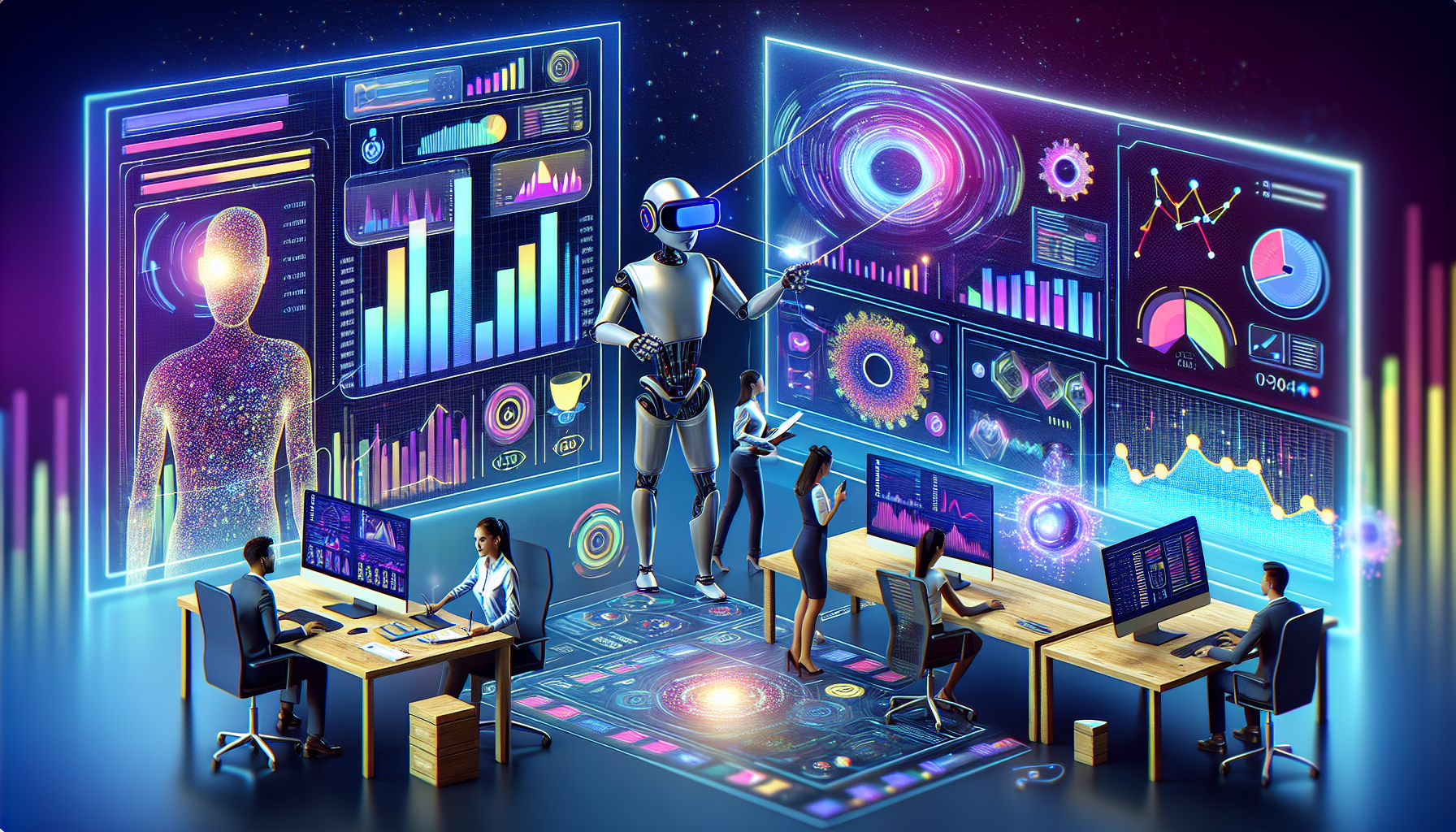Transforming Revenue Operations: How Will AI Impact RevOps in 2024?
As we eye the horizon of 2024, it begs the question: How will AI impact RevOps in 2024? Cutting through the complexity, this article directly addresses the transformative effects of AI on the RevOps sphere, from refining forecasting methods to personalizing customer interactions, and improving sales processes to optimizing workflows. We will navigate the concrete ways AI is set to streamline operations, boost efficiency, and enhance strategic decision-making, offering a glimpse into a future where AI and RevOps are intricately intertwined.
Key Takeaways
AI is enhancing revenue forecasting accuracy by analyzing historical data and market trends, enabling businesses to transform from financial reflectors to proactive predictors.
AI-driven personalization in sales, marketing, and customer success is improving conversion rates and ROI by offering tailored customer experiences, thereby fostering customer loyalty and providing a competitive edge.
AI’s integration in RevOps is optimizing workflows, breaking down silos, and enabling strategic decision-making, thereby increasing operational efficiency, improving customer journeys, and aligning team goals towards revenue growth.
AI-Driven Revenue Forecasting
In the quest for revenue optimization, RevOps teams have long grappled with unpredictable market trends and the sheer unpredictability of revenue data. However, the integration of AI tools like Salesforce Einstein Analytics and IBM Planning Analytics is revolutionizing this domain. These tools utilize AI to augment the precision of revenue forecasting, slicing through historical revenue data and market trends with machine learning algorithms to uncover patterns human eyes might miss. This not only fuels revenue growth but equips businesses to incorporate AI in decision making, transforming the revenue engine into a predictor rather than a reflector of financial success.
The genius of AI-driven insights lies in their adaptability. Unlike static models, AI systems are designed to evolve, scaling with a business and continuously learning from new data inputs. The result is a forecasting model that remains accurate and relevant, ensuring that businesses can stay ahead in a competitive landscape. Whether it’s for a startup or an established enterprise, machine learning models can be fine-tuned to address specific business needs and industry requirements, making AI a versatile ally in revenue optimization.
Significantly, AI’s role in revenue operations transcends mere numbers; it’s about the stories that precise, accurate data that can tell. AI tools provide the foresight that empowers leaders to craft strategies poised for success. With AI’s predictive prowess, companies can anticipate market shifts and adjust their sails accordingly, ensuring that they’re not just riding the waves of change but steering them.
Personalized Customer Interactions
In the interconnected ecosystem of sales, marketing, and customer success, personalization is the linchpin of customer experience. AI leverages machine learning to dissect the vast sea of customer data, providing personalized marketing campaigns that resonate with the individual needs and preferences of customers. Businesses, using advanced tools equipped with Natural Language Processing, can identify patterns in customer behavior and communication, customizing their approach personalized marketing campaigns for each distinct customer journey.
The implementation of personalized strategies is not without its challenges, yet the significant benefits are undeniable. AI-driven personalization has been shown to enhance conversion rates and ROI, as businesses can focus their marketing campaigns on the right prospects with pinpoint accuracy. This level of customization in communication not only elevates the value of the customer experience but also carves a distinct competitive edge over companies relying on traditional, broad-stroke marketing tactics.
Personalized customer interactions are an intricate dance, one that requires insight, timing, and finesse. With the aid of AI, marketing and customer success teams can perform this dance with unprecedented grace, turning potential customers into loyal advocates. The true value of AI-powered personalization emerges in these moments of connection—when a customer feels acknowledged, comprehended, and appreciated.
Streamlining Sales Processes with AI
The evolution of AI in sales is not just about automation; it’s a tale of transformation. Sales teams, once bogged down by repetitive tasks, are now experiencing a renaissance of efficiency. AI automation frees up to 40% of sales representatives’ time, allowing them to focus on what truly matters—building relationships and closing deals. With over 75% of sales operations departments reporting a spike in productivity, it’s clear that the leverage AI offers is a game-changer for revenue optimization.
Predictive AI provides a lens into the future, offering sales teams AI-driven insights into:
the optimal management of accounts, deals, and leads
making informed, strategic decisions that drive sales opportunities and growth
enhancing coaching and learning for sales reps by analyzing historical interactions and performance to pinpoint areas for improvement.
This foresight into competitor pricing, and accurate data on competitor pricing are invaluable for the sales team and sales professionals.
HubSpot’s AI tools, such as AI Chatbots and Content Assistants, are prime examples of how AI can streamline sales processes. These tools not only improve sales team' efficiency but also revolutionize the way sales marketing and customer success teams interact with prospects and customers. By incorporating AI, businesses can ensure that their sales processes are as efficient and effective as possible, giving them a distinct advantage in the competitive marketplace.
Optimizing RevOps Workflows
AI has become an indispensable ally for RevOps teams, redefining the very nature of revenue operations. AI, by automating workflows like account planning and lead research, allows revops professionals to move their focus from manual tasks to strategic decision-making. This has a profound impact on revenue optimization, as it allows teams to capitalize on operational efficiency and boost efficiency across the board.
The collaborative benefits AI brings to RevOps are immense. It breaks down departmental silos and fosters an environment where revops teams can work together seamlessly. With AI-driven technology, teams gain a comprehensive overview of the customer journey, which is critical for prioritizing revenue growth and supporting strategic decisions. This holistic approach to revenue operations ensures that every member of the team is aligned and working towards the same goals.
As revops strategy continues to evolve, AI stands at the forefront of this transformation. RevOps leaders are finding that by leveraging AI, they can optimize workflows in ways that were previously unimaginable. This is not just an incremental improvement—it’s a complete overhaul of the system that propels businesses towards success.
The Future of Data-Driven RevOps Strategies
The landscape of data-driven RevOps strategies is undergoing a seismic shift, thanks to the integration of AI. AI marries insights with actionable strategies, empowering revops professionals to mine deal data to make informed, proactive decisions that bolster revenue growth. Predictive analytics, a cornerstone of AI, allows marketing efforts to be tailored in advance, pinpointing upsell and cross-sell opportunities that bolster retention strategies.
The scalability of AI and machine learning algorithms is a testament to their transformative power within RevOps. As businesses progress, their requirements also change, and AI’s unique ability to adapt and evolve alongside these altering needs is notable. The ability to prioritize impactful marketing with limited resources is a perennial challenge, one that AI addresses head-on. With Net Revenue Retention (NRR) metrics emerging as the North Star metric in 2024, RevOps teams can rely on AI to guide their strategic compass.
Looking to the future, it’s clear that data will continue to play a pivotal role in shaping business strategies. AI not only harnesses the right data but also interprets it in the context of future trends, empowering companies and organizations to:
Anticipate and adapt to the ever-changing business landscape
Make data-driven decisions
Improve operational efficiency
Enhance customer experience
Optimize revenue generation
This is the future of RevOps—a future that is strategic, data-driven, and AI-enabled.
AI as a Catalyst for RevOps Innovation
Integrating AI into RevOps offers the following significant benefits:
Improvement in revenue management
Increased efficiency and insight
Transformation of prospecting techniques
Real-time analytics for instant strategic decisions
AI signifies a revolution in RevOps, acting as a catalyst for innovation.
For revops professionals, embracing AI has become essential to navigate the evolving business landscape. The shift driven by technological advancements and market dynamics demands a forward-thinking approach, one that AI is uniquely qualified to provide. As RevOps continues to grow and adapt to future trends, AI will remain a beacon of innovation, guiding teams towards successful outcomes.
The impact of AI on leadership roles within RevOps is particularly noteworthy. As the technology matures, we are likely to see leaders transition into more executive positions, such as Chief Revenue Officer or even CEO, reflecting the increased importance of revenue operations in overall business strategy. The transformation is evident: AI is not only changing the game—it’s redefining it.
The Impact of AI on RevOps Team Dynamics
AI’s impact on RevOps team dynamics is considerable and far-reaching. With the introduction of AI-enabled tools and methods, traditional roles within the team are being redefined. The result is a framework that is more dynamic and responsive to the needs of the business. As the boundaries of revenue functions become less distinct, a more cohesive and collaborative environment is fostered, which is crucial for the success of any organization.
The emergence leveraging ai# of ‘super managers’ is a striking example of AI’s transformative impact. Equipped with advanced data analytics, frontline managers are now capable of making more informed decisions, leading their teams with a level of insight that was previously unattainable. This shift in dynamics not only enhances the effectiveness of individual team members but also elevates the collective performance of RevOps teams.
As AI keeps seeping into the core of RevOps, the advantages go beyond just efficiency. It’s about empowering teams, redefining leadership, and creating an environment where innovation thrives. The impact of AI is clear: it’s a catalyst for positive change, transforming not just processes but people.
Summary
As we reflect on the transformative journey AI has taken us through in the realm of RevOps, it’s evident that the fusion of artificial intelligence with revenue operations is not a fleeting trend but a foundational shift in business practices. From enhancing forecasting accuracy to personalizing customer interactions and streamlining sales processes, AI has proven to be a formidable force in optimizing workflows and driving innovation. The future of RevOps is undeniably intertwined with AI, and as we look ahead, it’s clear that the organizations that embrace this synergy will lead the charge in their respective markets.
The implications of AI on the dynamics of RevOps teams are significant, heralding a new era of leadership and collaboration. By fostering a cohesive environment and empowering ‘super managers’, AI is redefining the very framework of revenue operations. As RevOps professionals navigate this new landscape, the potential for growth and success is limitless.
In conclusion, the impact of AI on RevOps is profound and multifaceted. It is an enabler of efficiency, a driver of valuable insights made, and a catalyst for innovation. As businesses continue to incorporate AI into their strategies, the horizon for revenue operations looks brighter than ever. The fusion of AI and RevOps is not just the future; it is the present, and it is redefining the blueprint for success in the digital age.
Frequently Asked Questions
How does AI improve the accuracy of revenue forecasting?
AI improves the accuracy of revenue forecasting by analyzing historical data and market trends with machine learning, uncovering patterns that may not be evident to human analysts. This allows for fine-tuned forecasts that are tailored to specific business needs and industry requirements, ensuring revenue engine have ongoing accuracy and relevance.
What are the benefits of personalized customer interactions powered by AI?
Personalized customer interactions powered by AI result in improved experiences, higher conversion rates, and increased ROI. AI allows businesses to tailor their marketing efforts based on customer behaviors and preferences, leading to more impactful communications.
How does AI streamline sales processes?
AI streamlines sales processes by automating tasks and providing valuable data for coaching, ultimately increasing productivity and efficiency within sales teams.
What role does AI play in optimizing RevOps workflows?
AI plays a crucial role in optimizing RevOps workflows by automating tasks, fostering collaboration, breaking down silos, and providing a holistic view leverage ai) of the customer journey to enable effective prioritization and decision-making.
How is AI transforming RevOps team dynamics?
AI is transforming RevOps team dynamics by redefining roles, fostering a cohesive work environment, and empowering frontline managers with advanced data and analytics, ultimately enhancing decision-making capabilities for more innovative revenue operations and business strategies.




